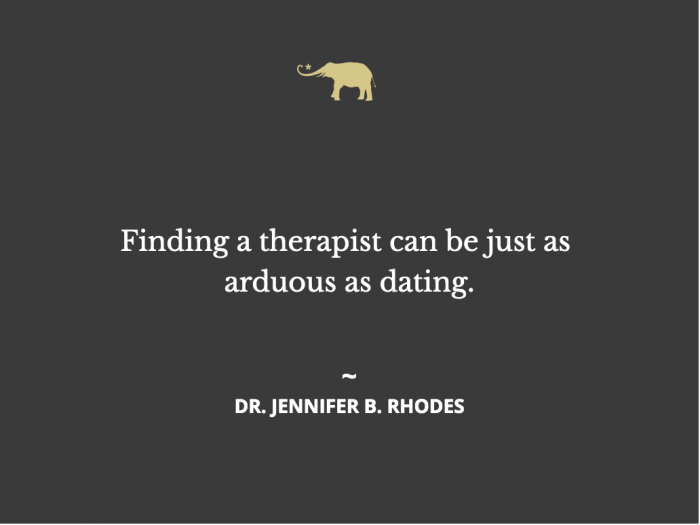If you are struggling to find the right therapist, you are not alone.
I remember my very first foray into the mental health world was in group therapy in high school. I had to fake my mother’s consent because no one in my family thought therapy was important after the death of my father. Fortunately, it was a positive experience with a well-trained social worker.
Most of us have horrible first-time experiences in therapy. Whether it is the stress of trying to find one on our insurance plan to finding one who does not make us feel like we have lost brain cells to one who treats us like a human being rather than a test case, finding a therapist can be just as arduous as dating.
Here are five tips to help make the search a little easier:
1. Ask your friends and business colleagues for a referral. Word of mouth and connecting people to the right therapist is often the best way to find a good match. All of my long-term therapists were found word of mouth.
If you value someone or you like the way they are living their life, ask to see who has been on their support team. You may be surprised to hear that they have a therapist, a coach, a healer, a yoga master, or various other people they have worked with through the years. Asking is scary, but it is the best way to find someone.
2. Be willing to pay out of pocket. I hate to tell you that searching your insurance plan is likely to give you access to a therapist with less experience. While this is changing, when you are committed to paying out of pocket, you will also work harder in your therapy.
Decide if you are looking for someone to simply vent to or if you are ready for true transformational work. If you just need some support—which we call supportive psychotherapy—then many traditionally trained therapists are a good fit. If you desire a long-term relationship with a therapist, however, start expanding your search beyond your insurance list.
3. Be ready to meet with your therapist at least twice before making a final decision. It is like dating. You should schedule two to three sessions and discuss the following topics:
>> Finances: always ask for a sliding scale option or what the insurance situation is either prior to or during the first session. Be honest about your budget. If you are willing to actually work on yourself, a good therapist will slide their fees for you. (We love helping people who are ready for real change.)
>> What is their initial impression? You don’t go to therapy to hang out with your therapist, so use your money wisely and ask what they think you need to heal. I often explain how the mind, body, and soul all need different things to heal, so therapists should give the client the option of how to design their healing journey. If they cannot give you feedback after two sessions, move on. Your time and money are important.
>> What do they do other than be a therapist? In this day and age, it is important for you to feel welcomed. Do you need a therapist who is also a parent? A therapist who is creative? A therapist who has healed on their own before? A therapist with a personal story of treating anxiety (which is most of us by the way). Think about what it is you need and just ask questions. If they are not willing to open up, ask why. If that doesn’t lead to clarity ask, “What is your theoretical orientation so I may decide if you are the right fit?” Then listen, not with your mind, but with your body, and decide how the answer makes you feel.
>> What are your views of psychedelics, alternative health, and spirituality? I remember networking in Canada with a therapist who said she was Christian but never told her clients. I asked why and she said it wasn’t relevant. Like heck it’s not relevant! In the United States, well-trained therapists with a spiritual background are hard to find. If alternative medicine or spirituality are important to you, ask questions about their background. Then see how it makes you feel.
>> Ask if they are trained in yoga, meditation, fitness, or other wellness modalities: traditional talk therapy may not be what you need, but many therapists are trained in other modalities. Explore whether they should be your meditation teacher rather than a therapist or if they recommend healing the body over the mind first. It’s your journey, and you can start wherever you wish.
4. Remove the mindset that the therapist knows all. In the United States, we tend to put medical professionals, in general, on a pedestal as experts. This is appropriate if you are seeking a surgery consultation, but for therapy, it’s important to see the relationship as an equal partnership.
If you are worried about power dynamics (especially if you are a trauma victim or a POC), then bring up the concern early on. It’s not an easy topic, but putting your therapist into the role of knowing more than you can lead you off track in your healing. It should be a partnership.
5. Be prepared to do the work. No matter what modality you choose, the initial foray into healing is at least a two-year journey. Whether that is healing the mind, body, or the soul, it takes time. There is no way around it. Have an open conversation about the expectations of therapy and what it is you really need.
Early on, I needed more yoga and less therapy, but that was never brought to my attention. I had to follow my intuition. Later on, I needed hypnosis by a trained therapist but not traditional talk therapy. Sometimes your soul knows what you need and practicing having this kind of conversation with a professional will boost your self-confidence and help you recover more quickly.
Most people give up within the first three months. The reason? In my opinion, psychotherapy is not where they are supposed to start their journey or they need therapy and a physical wellness practice.
Healing can take a decade or more and is a difficult journey. Practice patience and self-compassion. If you are able to flow with what is going on, you may be surprised to see who or what shows up in your life that can have a profound impact on your journey.
“Life doesn’t make any sense without interdependence. We need each other, and the sooner we learn that, the better for us all.” ~ Erik Erikson
~







Read 4 comments and reply